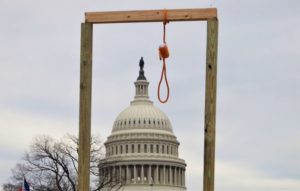
Republican idea of smaller government
At least since the days of Ronald Reagan, the Republican Party has tried to brand itself as the party of “smaller government.” Sometimes they add “and lower taxes.” Indeed, Republican anti-tax activist and Reagan ally Grover Norquist once famously stated that:
I don’t want to abolish government. I simply want to reduce it to the size where I can drag it into the bathroom and drown it in the bathtub.
Presumably, such an identification tests well among GOP faithful, including today’s MAGA base, who sadly vote against their own self-interests based on race-baiting and other cultural hot-buttons such as abortion and guns. As an initial matter, however, plenty of polls indicate that most Americans don’t want small government. Rather, they like a full-size, robust “good government,” as we like to call it. That includes, for example, Social Security, Medicare, good highways, public schools, the U.S. Postal Service, a competent FEMA to assist with major emergencies such as hurricanes, universal background checks for gun sales, and more. Likewise, most Americans oppose federal government shutdowns, and correctly blame Republicans when they occur.
But even if most Americans wanted smaller government, the Republican myth that they are the ones who deliver that is false. A perfect case in point is Florida, which is almost entirely Republican-run under Governor (and likely 2024 GOP presidential candidate) Ron DeSantis, along with a state Senate that is 70 percent Republican and a state House that is similarly 71 percent GOP. In Florida, far from the Republican myth of “smaller government,” the GOP state government is huge and extremely intrusive. Here are some examples:











